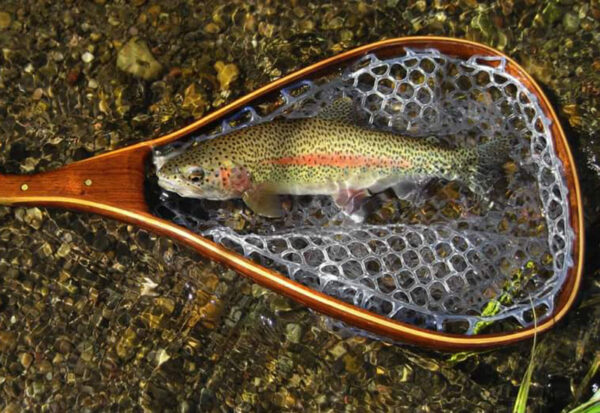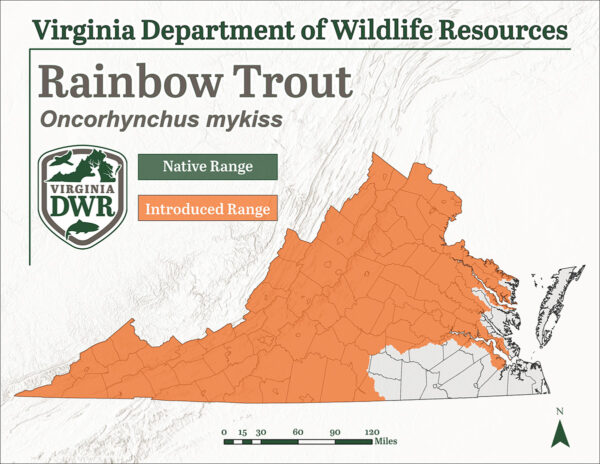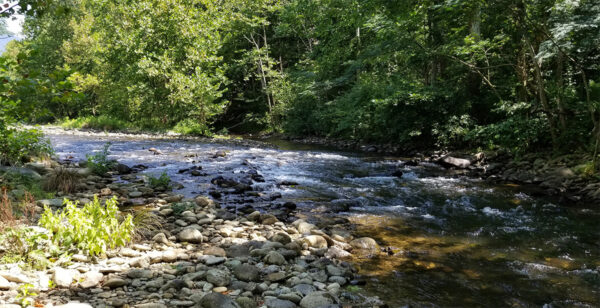Fact File
Scientific Name: Oncorhynchus mykiss
Classification: Fish, Order Salmoniformes, Family Salmonidae
Size: Rainbow Trout can exceed 20 inches in length in Virginia
Life Span: The lifespan of Rainbow Trout in Virginia ranges from 3 to 10+ years, and is heavily dependent on the waterbody they inhabit
Diet
Rainbow Trout are opportunistic feeders, but regularly consume benthic macroinvertebrates, crustaceans, and other fish.
Identifying Characteristics

A wild (streamborn) Rainbow Trout, which can be found in several Virginia waters
- Dark spots on a light background throughout the body
- Forked caudal (tail) fin
- Black spots throughout the caudal and dorsal fins
- Rosy colored gill plate
- Pectoral, pelvic, and anal fins often have a white leading edge
- Adipose fin
How to Discern from Similar Looking Species:
Brook Trout Salvelinus fontinalis
- Brook Trout have vermiculations along their dorsal. These are worm-like patterns that will be absent in Rainbow Trout
- Brook Trout do not have spots throughout the caudal fin
Brown Trout Salmo trutta
- Brown Trout have a square caudal fin, and while some spots may be present, they will not persist as prominently and uniformly throughout the dorsal and caudal fins as they do in Rainbow Trout
Salmonidae Characteristics and Anatomical Terms


Illustrations by ©Makayla Haggard – DWR
Distribution
Rainbow Trout are native to the western United States in waters that flow into the Pacific Ocean. They have been introduced throughout portions of Virginia and much of North America as an additional recreational opportunity for anglers. Anglers are reminded that it is illegal to stock fish into a public body of water without an authorization from the Virginia Department of Wildlife Resources.

Habitat
Rainbow Trout require pristine water that is both cold and highly oxygenated. They prefer to inhabit sections of stream with cover in the form of large woody debris, root wads, undercut banks, and forested canopies.

A trout stream in Virginia’s Piedmont.
Reproduction
Rainbow Trout spawn in the spring. Leading up to a spawning event, Rainbow Trout will display a more vibrant color variant than is typically observed at other times of the year. Females will become visibly engorged in the abdomen with the presence of eggs. Like other members of the Salmonidae family, Rainbow Trout construct gravel nests known as redds in which they lay their eggs. The eggs stay incubated within the redd for 4 to 6 weeks, requiring a consistent flow of clean oxygenated water during this time.
Last updated: March 18, 2025
The Virginia Department of Wildlife Resources Species Profile Database serves as a repository of information for Virginia’s fish and wildlife species. The database is managed and curated by the Wildlife Information and Environmental Services (WIES) program. Species profile data, distribution information, and photography is generated by the Virginia Department of Wildlife Resources, State and Federal agencies, Collection Permittees, and other trusted partners. This product is not suitable for legal, engineering, or surveying use. The Virginia Department of Wildlife Resources does not accept responsibility for any missing data, inaccuracies, or other errors which may exist. In accordance with the terms of service for this product, you agree to this disclaimer.

